When I first joined Global Medical Brigades at The University of Central Florida in 2017, I fell in love instantly. GMB stuck out to me as the only organization at my college with an emphasis on avoiding voluntourism while still doing highly meaningful work with the holistic model. With its accessibility to everyone who wishes to attend a Brigade, I felt welcomed into my university’s little family almost instantly.
In my five years with GB, I’ve made incredible friendships with general members and the board members of our club alike. I’ve seen my GB family pour their heart and soul into Brigades, going the extra mile for supply collection, transportation, fundraising, and education. Covid-notwithstanding, I’ve brigaded every year since beginning my journey with GB, and will continue to do so for the foreseeable future.
1. Nicaragua - It's more than just a Brigade, literally.
In 2018, I embarked on my first Brigade with my wonderful GB family, who I’d grown close to over the course of one year filled with busy preparation. To make matters more exciting,
Nicaragua also marked my first international travel expedition…ever. I felt as though I was
walking on air the entire Brigade, elated at the experience of being in a foreign land. Culture
shock, in some capacity, is very real - many of my fellow brigaders took a bit to adjust to the
environment, having been born and raised in the US. There is a certain sense of
simultaneous wonder and anxious detachment that inherently comes with spending a week in a nation you’ve never been to, with a different way of life and a different natural environment. We’d discussed culture shock in passing during pre-departure meetings, with leaders counseling both general members and one another throughout the duration of the trip. The first Brigade, for any brigader, is always the most daunting. If you can conquer the culture shock the first time, you can conquer anything. With over 1,000 patients attending three days of clinic, any personal concerns we had were quickly overshadowed by hard work and the smiles of community members.
In late May of 2018, two weeks after my first Brigade, GB ceased brigading
operations in Nicaragua after months of political turmoil came to a tragic head. As of now,
Nicaragua remains closed to brigaders for the foreseeable future. However, in my time in the
country, the signs of unrest were present in the form of harrowing stories from community
members, political signs and graffiti all around, and the specific (and highly effective)
precautions taken by GB to ensure safety. With the narratives pushed about Latin America from back home in the US, I began to consider the situation. I am one of the only members of my chapter who is not a medical major; instead, I found my calling in clinical psychology, which I hope to utilize within GB someday as a professional. In psychology, we are taught to consider a “biopsychosocial” approach - that is to say, consider the biological, psychological, and social influences in a person’s life to understand their needs, behaviors, and stories. When placed over the backdrop of Nicaragua, the implications ranged from an explanation of hypertension secondary to coffee availability to stress-related symptoms caused by current events. A true Medical Brigade, ironically, was more than just medical intervention; considering the community’s needs meant considering their entire situation.
On our cultural exchange day, a kind community member proudly gave us a detailed tour of his coffee plantation, serving us each black coffee out of his own home. Near the end, he became tearful, speaking to us from the heart. “Please don’t listen to people who don’t live here, people who call us bad or violent. This is our beautiful country that we love. We are proud and hardworking people who love this country. I’m so glad you got to see it for yourselves.” His words still stick with me to this day.
Top Tip: I accidentally got bit by a root-boring beetle here. My finger was purple for
several days. Always wear your glasses if you’re going to be near wildlife.
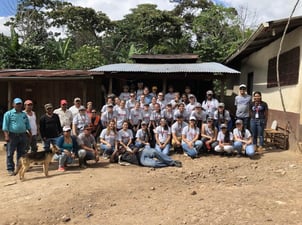
2. Panama - It takes a village.
Panama, my second Brigade in 2019, was the first Brigade in which both myself and a very
small handful of other members had become “Brigade veterans”. We spent a solid amount of
time drawing on our experiences in Nicaragua to help the first-timers who accompanied us.
Panama’s communities, nestled deep in the country’s greenery, were composed of indigenous men, women, and children with their own unique ways of life. The clinic was far less crowded than Nicaragua had been, but still bustling nonetheless. Once again, my chapter excelled at putting their best foot forward to assist the community in any way they could.
During our cultural exchange day, these same indigenous community members held an open-air craft fair and market, selling their handmade goods to benefit their families and community. Of course, given their target population, the market was a hit - every college student walked away with at least two to three local craft souvenirs to bring home. When my coordinator explained the market’s origins, however, I found a whole new meaning behind our experience. Several days to weeks prior, a Business Brigade had ventured into this specific community as well, assisting with financial literacy, loans, and general construction and maintenance of a business. Here, where we were shopping, stood that exact same business, empowered and fully utilizing the tools they’d been given. To see the holistic model at work in real-time was incredible, hammering home the importance of each and every branch of GB within a single community. Once again, I was hooked on the holistic model.
Top Tip: I lost my entire bag of clothes somewhere in TSA. While I thankfully kept my scrubs, my Brigade was a bit more of an adventure than usual. Always double-check your bag at the airport.
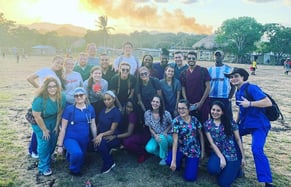
3. Ghana - Cultural sensitivity is a must.
The latter portion of 2019 also saw my third Brigade, and my first true “overseas” venture.
Several long, long flights later, there was a surreal sensation that came with setting foot in Africa for the first time. Similar to Latin America, being on the ground of another foreign land with a poor Western narrative was somewhat indescribable. The culture was leagues different than that of Latin America, but the hospitality was identical - the community welcomed us with open arms, with translators and healthcare professionals working closely alongside us every step of the way. As could be expected, the translation barrier was a far bigger hurdle to clear, given that we had far more Spanish-speakers in our party than Fante-speakers. The clinic, still bustling, went spectacularly despite the boundary of language between us and the community members (especially considering bubbles and stickers seem to be their own language among children, regardless of nationality).
There was, however, a second hurdle to conquer among our chapter. As mentioned, there is a certain narrative and perspective instilled by years of Western coverage and discussion that is specific to Africa. It is highly important to consider the innate biases we all carry, whether or not we are consciously aware of them. Prior to Ghana, we spent more time covering cultural sensitivity than any Brigade prior, discussing the “savior” narrative, proper post-Brigade social media discussion, and general attitudes to be kept and considered while working in West Africa. Even so, Ghana is a unique uphill struggle for challenging our biases and still engaging with the community with a sense of respect and sensitivity. Once again, the “biopsychosocial” perspective comes in handy.
Top Tip: As a native Floridian, I had been under the impression that I did not need
sunscreen, having grown up in the heat my entire life. A stone’s throw away from both the
equator and the prime meridian, I found out exactly how wrong I was with hot sand under my feet. I brought home the worst sunburn of my life, peeling for two weeks. Always bring
sunscreen to Africa.
4. Greece - Remember your reason for Brigading.
After an agonizingly-long wait in the wake of COVID-19, my chapter’s Brigades were back up
and running in 2021. After a one-year break from brigading, I was itching to get back into the
fray, with supplies left over from 2020 Brigade prep burning a hole in our pockets. The only time I’d set foot in Europe prior to my fourth Brigade was during a layover to Ghana, during which time my chapter and I spent eight hours in Amsterdam. While one long flight was better than two, the journey to Athens was well worth the travel.
Greece, both in general and relative to the holistic model, was different. The population and environment differed wildly from the rural pop-up clinics of Brigades past. In the heart of Athens, a five-minute walk on foot from our towering hotel, sits one of the first GB urban clinics, nestled amongst other NGOs in the area. In terms of the program and the implementation of GB within a partner country, Greece is still my favorite to this day. The unique refugee populations serviced from multiple nations were well-accommodated in terms of both medical aid and much-needed translation assistance. Compassion and empathy were a running theme within the clinic itself, and were well-considered amongst both staff and brigaders.
Similar to Ghana, however, the name “Greece” carried a similar yet dissimilar connotation rife with a need for cultural consideration. Much effort went into hammering home an understanding of the plague of voluntourism, by which a conscious effort must be made to separate the work of a Brigade from a vacation. The allure of seven days in a hotel in a major European tourist destination proved to be a challenge to conquer, and one unique to this Brigade. It is essential to keep in mind exactly why you’re brigading in the first place, along with what sets GB aside from other student-led organizations. Keep your eyes on the prize - empowerment, not vacation.
Top Tip: There are many, many cats in Athens. Please don’t pet wild animals, even if
they’re very cute.
5. Guatemala - You get out what you put in.
The second half of 2021 netted me my fifth Brigade, complete with a mostly-new round of
brigaders within our chapter. Many of them were bright-eyed, passionate, and eager to do work that they’d always dreamed of doing. If not tooting my own horn somewhat, I was proud of their efforts and ambition; they reminded me of the passion I’d felt during my first Brigade. By this point, I was a true “Brigade veteran”, with first-time brigaders asking me and other board members a multitude of questions regarding the GB mission at large. Admittedly, there is a running joke in my chapter about me being a “GB Nerd”, by which I might talk about the holistic model a little bit too much. This led to impromptu gushing (very welcome, on my part) regarding GB's goals, efforts, and plans on a regular basis.
At the end of the Brigade, most brigaders, including those who’d spoken with me extensively, expressed that they wish they’d known more about GB before embarking on the Brigade itself. Many of these members would go on to do just that, carrying their own experiences in combination with GB information they’d learned at home onto future brigades. While combing the entire history of GB is not necessarily a must to maximize your Brigade experience, a strong understanding of the components, methods, and holistic aspects of the GB programs helps tremendously with mindfully engaging in your role as an in-country brigader. Recognizing the difference you’re making in detail is one of the greatest souvenirs you can bring home.
Top Tip: The communities of Guatemala tend to be mountain-side, and the compounds are no different. For a tropical country, each morning was very, very cold. Bring warm clothes.
6. Honduras - An empty clinic isn't necessarily a bad thing.
In 2022, I embarked on my most recent Brigade in May, finally coming full-circle to my sixth Brigade. In Honduras, I finally completed my “collection” of GB programs, at which point I, admittedly, cried. It was humbling to stand where GB had begun its work decades ago in the early 2000s, and even more incredible to see the impact their mission has had on each community. Ironically, there was little to actually see. In comparison to the massive clinic hubbub in Nicaragua, and even to the sizable clinics of other Brigades past, Honduras was relatively quiet. Of course, the community members who attended the clinic still expressed nothing but gratitude, exuding kindness and hospitality as always.
Several brigaders, many of whom were once again new to Brigades, expressed a bit of sadness and discouragement that the clinic was not well-attended, seeing roughly under 200 people over the course of three days. However, this, to me, was not at all a bad thing: I explained the holistic model yet again (as I physically cannot stop doing), reminding them the manner by which communities gradually become empowered with the resources given to them. If people are not attending the clinic, it likely means they do not need to attend the clinic, instead able to fully utilize information taught during workshops, utilizing assistance provided by trained community health workers, maintaining health through clean water and sanitation access, and even attending other clinics regularly for check-ups. While there is merit to being somewhat bummed over a smaller pool of opportunities to shadow, a small clientele in a country long-engaged with GB no doubt means communities are one step closer to full empowerment.
Top Tip: Somehow, mosquitos in Honduras decided they like me far more than
mosquitos in every other country. Bug wipes exist and are generally more comfortable than bug spray.
I adore GB with all my heart, and will need to be physically pried away from the
organization before I stop brigading. I am excited to begin the process of looping back around to previously-visited countries, utilizing my experience from each to be even more effective as a brigader. I am nothing but grateful to all the incredible fellow brigaders I’ve encountered along the way, and even brigaders from other universities met in passing during my Brigades! Years down the line, I hope to eventually return to GB as a full-fledged professional to assist in their mission in a different way. Until then, I will keep the holistic model close to my heart and continue to brigade my heart out. In helping to empower others, you help to empower yourself.


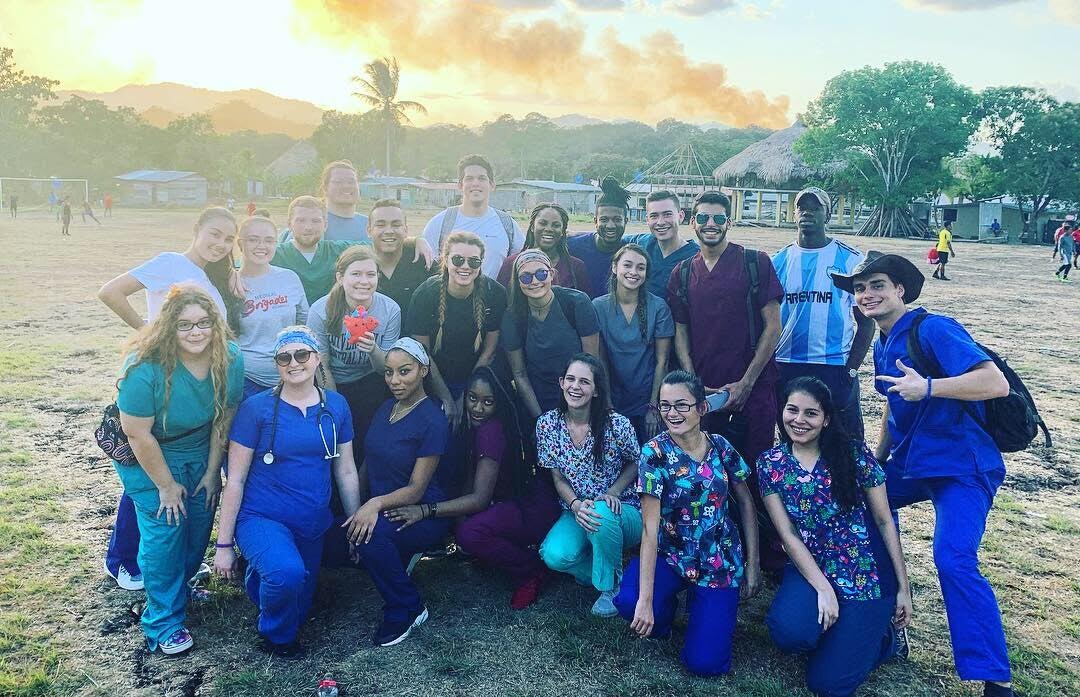
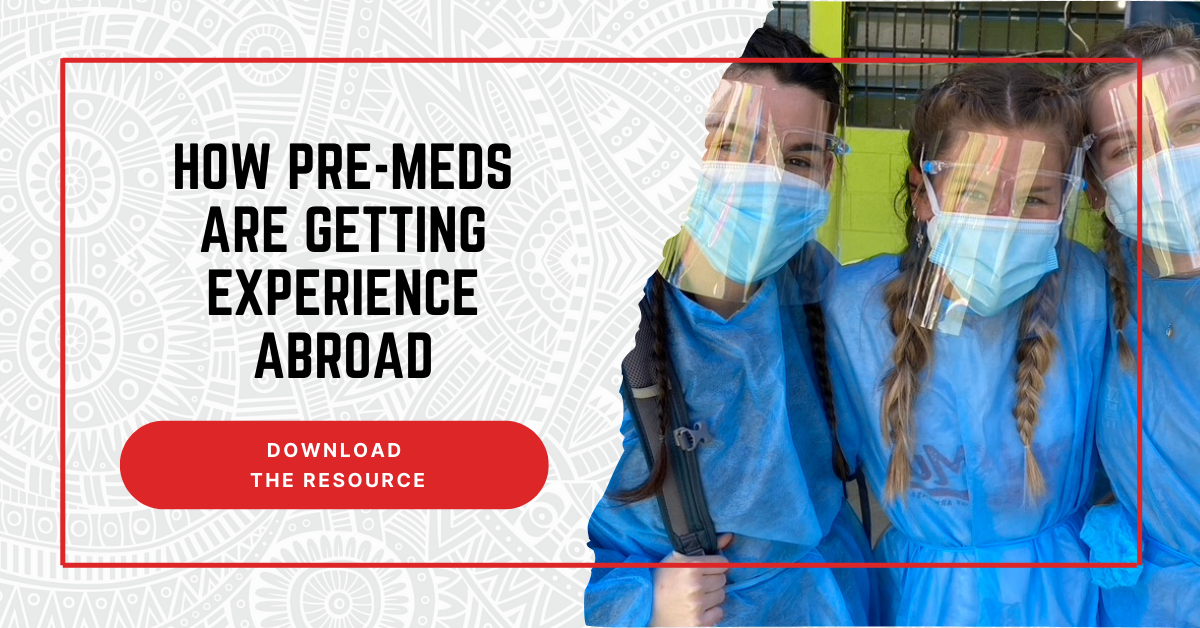
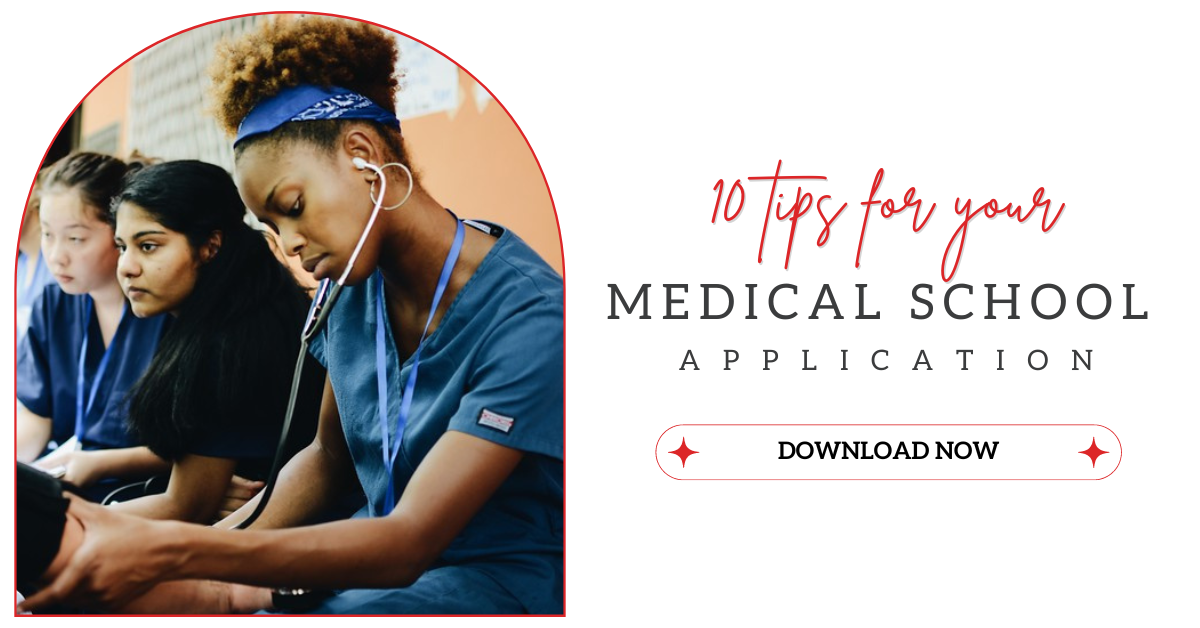

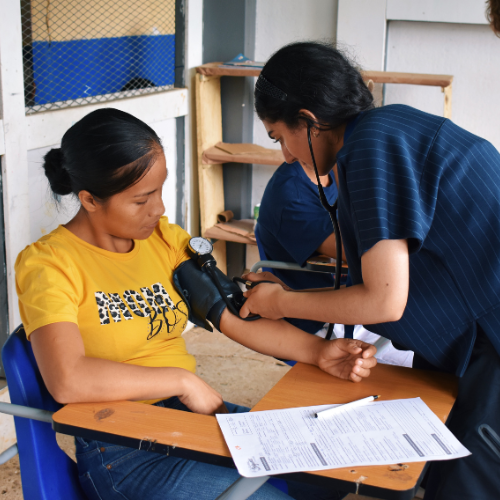
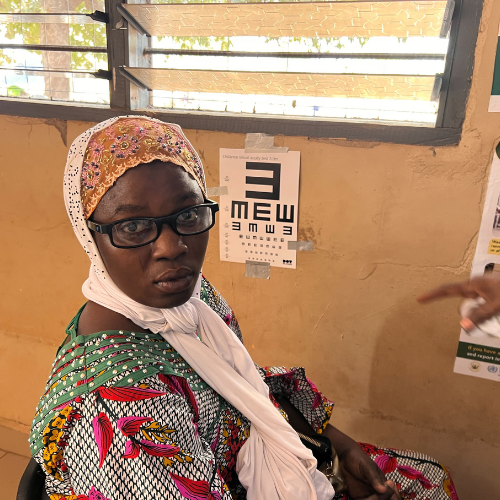
-1.png)